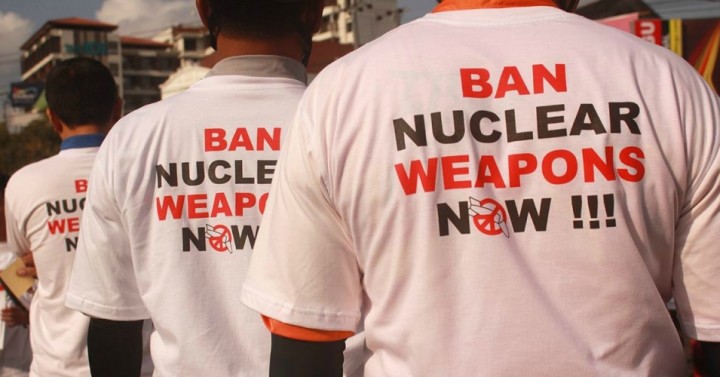The year 2015 will be remembered sadly for the many ways in which war and armed violence devastated the lives of millions of people around the world—armed conflicts in Ukraine, the Middle East, and Africa; a global refugee crisis spawned by those conflicts and by the atrocities of the radical Islamic State; massacres in Kenya, Nigeria, Syria and elsewhere; an expanded use of cluster munitions and landmines in conflict zones; and countless other mass shootings and suicide bombings.
The nuclear-armed states not only wasted another year in avoiding compliance with their disarmament obligations, but they also made matters worse by increasing their investments in nuclear modernization programs. The much-touted international agreement with Iran on its nuclear programs was overshadowed by the increased risk that escalation of the conflicts in Ukraine, South Asia, or the Middle East could lead to the use of nuclear weapons by those who actually have them.
In the midst of the seemingly endless series of headlines about the victims of war, armed violence, and acts of terror, 2015 was a year when IPPNW and its many partners in civil society took significant steps to ban and eliminate nuclear weapons and to bring the expertise of doctors and public health professionals to the global promotion of violence prevention.
Here are just a few highlights:
The medical and environmental facts about nuclear war, including our nuclear famine findings, were at the forefront of the evidence reported out from the Vienna Conference on the Humanitarian Impact of Nuclear Weapons (HINW) and submitted to the 2015 NPT Review Conference and to the UN General Assembly. IPPNW and its partners in ICAN worked tirelessly to build support for the Humanitarian Pledge launched by Austria at the conclusion of the Vienna conference. The Pledge to fill the legal gap to stigmatize, prohibit and eliminate nuclear weapons has now been joined by 121 countries.
A new open-ended working group (OEWG) established by the General Assembly at the end of the year will meet in 2016 to discuss and recommend ways to make nuclear disarmament a reality. We will be active civil society participants in this OEWG, making ICAN’s case that a new treaty banning nuclear weapons is the most effective way to fill the legal gap and to put the nuclear-armed states on notice that they can no longer postpone elimination of the world’s most dangerous and unjustifiable weapons.
We worked with friends and colleagues at the World Medical Association this year on a strong new resolution condemning nuclear weapons. The resolution, which cited our findings about nuclear famine and urged governments to ban and eliminate nuclear weapons, was adopted unanimously at the WMA Assembly in Moscow. Next year, IPPNW and its affiliates will engage in outreach to national medical associations in order to promote implementation of the resolution.
For IPPNW, ICAN, and a growing number of countries that are determined to rid the world of nuclear weapons, 2016 will be the Year of the Ban Treaty.
This was another headline year for our Aiming for Prevention program, as we continued to conduct “dialogues with decision makers” around the world on the health effects of armed violence, from meetings at the United Nations to forums of the World Health Organization’s Violence Prevention Alliance. We cooperated with the Stockholm-based Parliamentary Forum on Small Arms and Light Weapons to bring doctors and parliamentarians together to discuss public policy measures to prevent armed violence and make the Arms Trade Treaty a strong and effective humanitarian-based treaty.
As the leading NGO health voice in the Arms Trade Treaty (ATT) process, we have brought our “guns are bad for health” message from Trinidad to Nairobi, Vienna to the ATT 1st Conference of States Parties in Cancun, Mexico. The 2002 WHO World Report on Violence and Health included passing an international agreement to curb the international arms trade as one of its nine priority goals—with the ATT entry into force a year ago, we did it!
We also continue to address how health professionals and governments can and should be working together in every country to prevent armed violence at meetings of the UN Programme of Action on Small Arms and Light Weapons, and we work locally to that end. This past year we published the promising results of an IPPNW Zambia/Austria project “Improving care for victims of violence in resource-poor settings such as Lusaka, Zambia: results of a low-budget intervention”, a research and education project that involved over 30 medical students and multiple local social service and medical agency partners.
Our year-end pledge is to maintain and strengthen IPPNW’s voice—and the voices of doctors worldwide—in the pursuit of a more peaceful world no longer at risk of extinction in a nuclear winter.










